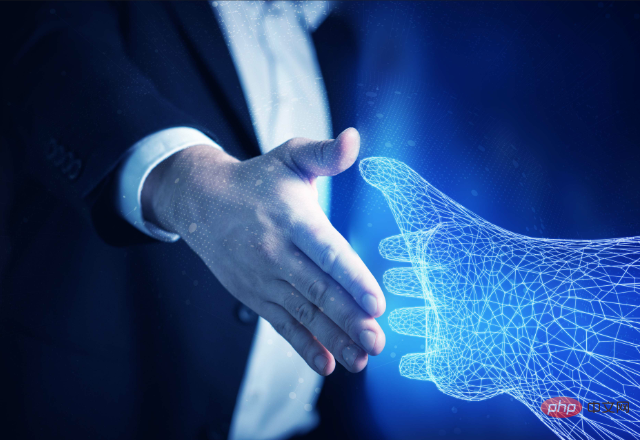Home >Technology peripherals >AI >Advantages and Disadvantages of Artificial Intelligence in the Workplace
Advantages and Disadvantages of Artificial Intelligence in the Workplace
- PHPzforward
- 2023-05-11 16:49:061508browse

Artificial intelligence (AI) has quickly become an important tool in various industries, including the workplace. While AI can provide many benefits, such as increased efficiency and productivity, it also comes with its own set of challenges.
Artificial intelligence is a rapidly evolving field that has the potential to revolutionize the way we work, learn and interact with technology in the workplace.
The term artificial intelligence refers to the ability of machines to perform tasks that typically require human intelligence, such as decision-making, problem solving, and natural language processing. As AI technology continues to advance, it is increasingly being integrated into every aspect of the workplace, from automating repetitive tasks to helping professionals make smarter decisions.
The impact of artificial intelligence on the future of work is a much discussed and debated topic. Some experts believe that AI will lead to the unemployment of human workers, while others believe that it will create new opportunities, increase productivity and economic growth. It’s clear that whatever the outcome, AI will have a profound impact on the job market and the skills needed to succeed in the workforce.
In this context, it is crucial to understand the potential benefits and risks of AI in the workplace, as well as the ethical implications of using AI to make decisions that impact human lives. As artificial intelligence continues to evolve, individuals and businesses alike must stay informed and adapt to the changing work environment.
Artificial intelligence will change the future of work in many ways.
Advantages of Artificial Intelligence in the Workplace
Improving efficiency: Artificial intelligence can automate many daily tasks and workflows, allowing employees Ability to focus on higher-level tasks and increase productivity.
Improve accuracy: AI systems can process large amounts of data quickly and accurately, reducing the risk of errors.
Better Decisions: Artificial intelligence can analyze data and provide insights that humans may not recognize, leading to better decisions.
Cost Savings: By automating tasks and workflows, AI can reduce labor costs and improve a business’s bottom line.
Enhanced customer experience: Artificial intelligence chatbots and other tools can provide customers with fast, personalized service and improve the overall experience of a business.
Disadvantages of Artificial Intelligence in the Workplace
Job Transfers:As mentioned earlier, artificial intelligence and automation may Many workers, especially those in low-skilled jobs, would be redeployed.
Skills Mismatch: As artificial intelligence and automation become more common, workers will need to develop new skills to remain competitive in the workforce.
Bias and Discrimination: AI systems are only as fair as the data they are trained on, which can lead to discrimination in hiring, promotions, and other workplace practices .
Ethical Issues: As artificial intelligence and automation become more commonplace, there are many ethical issues that need to be addressed, including those related to privacy, transparency, and accountability related questions.
Cybersecurity Risks: As more and more data is collected and processed by artificial intelligence systems, this data may be compromised by cybercriminals.
Loss of human interaction: AI systems may replace some forms of human interaction in the workplace, potentially resulting in a loss of social connections and collaboration among employees .
Skills Usage Gap: As mentioned earlier, not all employees and organizations have equal access to AI and automation technologies, which may widen the use of these The gap between people who have tools and people who don’t know how to use them.
These are just some of the advantages and disadvantages of artificial intelligence and the future of work. As AI continues to evolve, new advantages and disadvantages may emerge.
What’s next for artificial intelligence in the workplace?
The impact of artificial intelligence on the future of work is a complex, multifaceted issue that requires careful consideration and planning. While AI has the potential to revolutionize the way we work and increase productivity, it also poses significant challenges, including job changes and ethical issues.
To prepare for the future of work, individuals and businesses must prioritize upskilling and reskilling to ensure they have the skills and knowledge they need to thrive in an AI-driven world. Additionally, policymakers must address the potential impact of AI on employment and work to develop policies to ensure that AI’s benefits are shared equitably.
The successful integration of AI into the workplace will require collaboration and dialogue between industry, academia and government to ensure that AI is used in ways that benefit society as a whole. By staying informed and proactive, we can respond to the changes brought about by AI and create a future of work that is efficient and equitable.
The above is the detailed content of Advantages and Disadvantages of Artificial Intelligence in the Workplace. For more information, please follow other related articles on the PHP Chinese website!
Related articles
See more- Technology trends to watch in 2023
- How Artificial Intelligence is Bringing New Everyday Work to Data Center Teams
- Can artificial intelligence or automation solve the problem of low energy efficiency in buildings?
- OpenAI co-founder interviewed by Huang Renxun: GPT-4's reasoning capabilities have not yet reached expectations
- Microsoft's Bing surpasses Google in search traffic thanks to OpenAI technology

